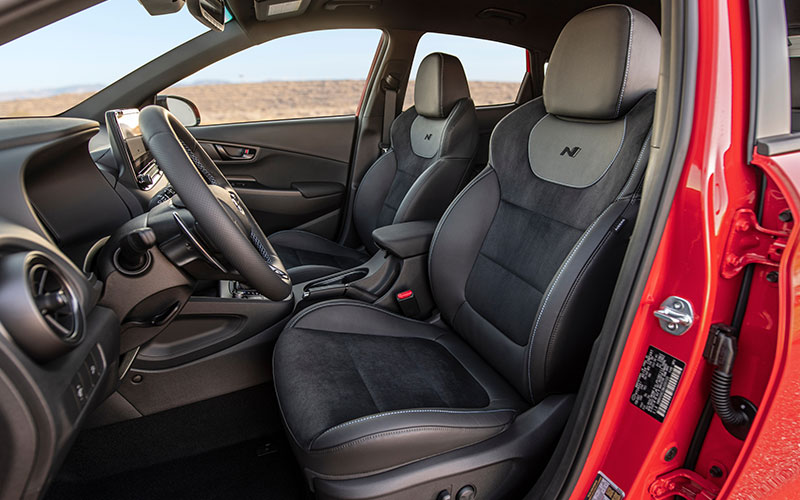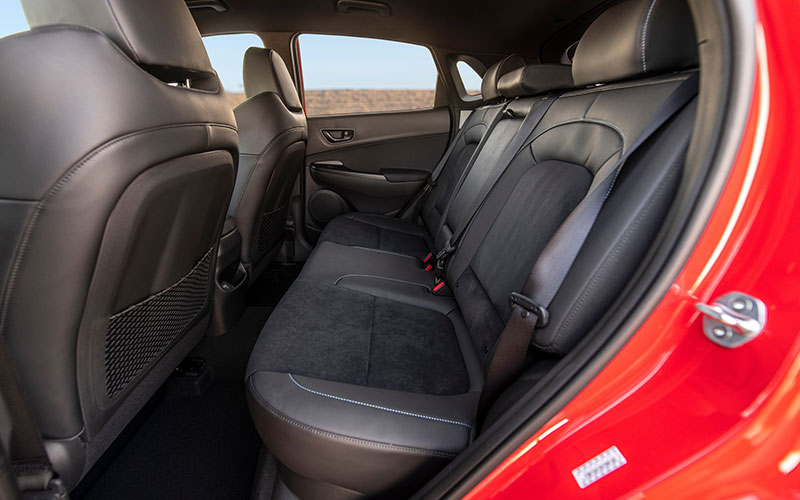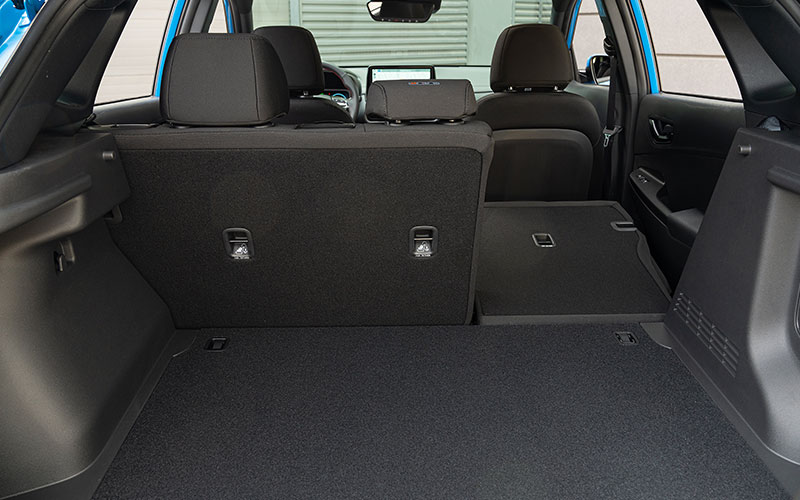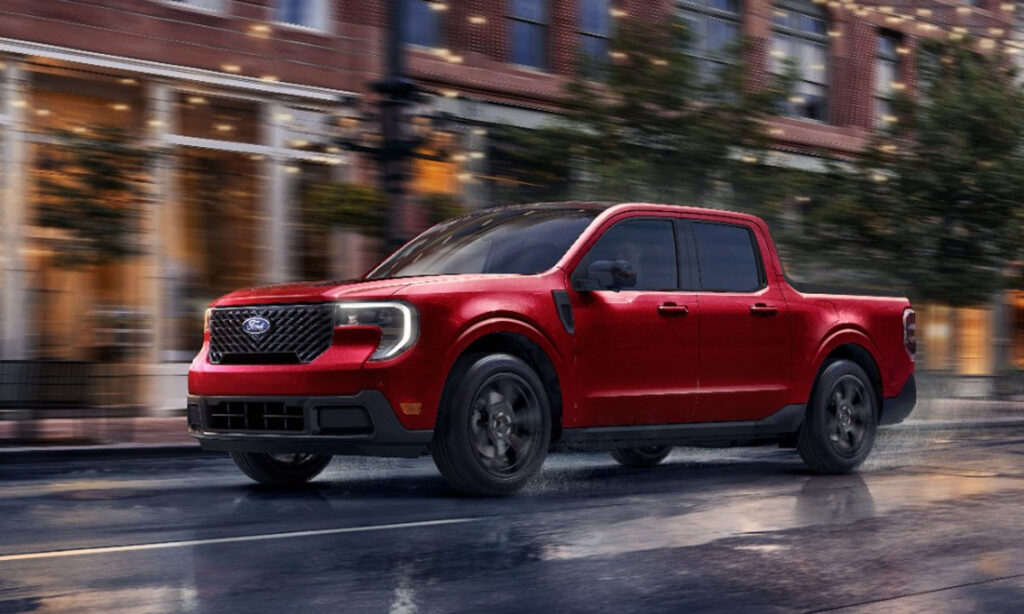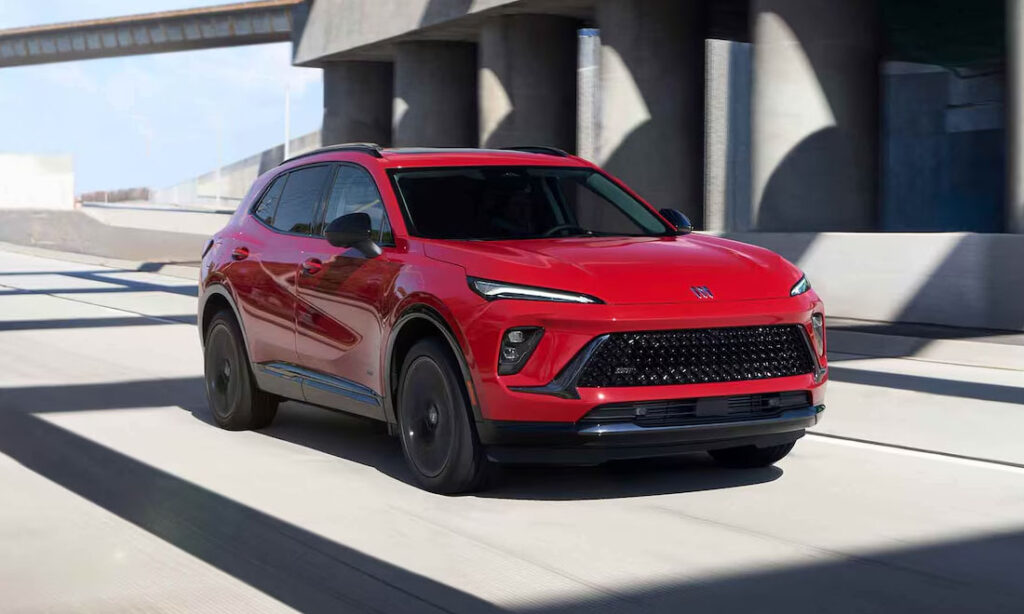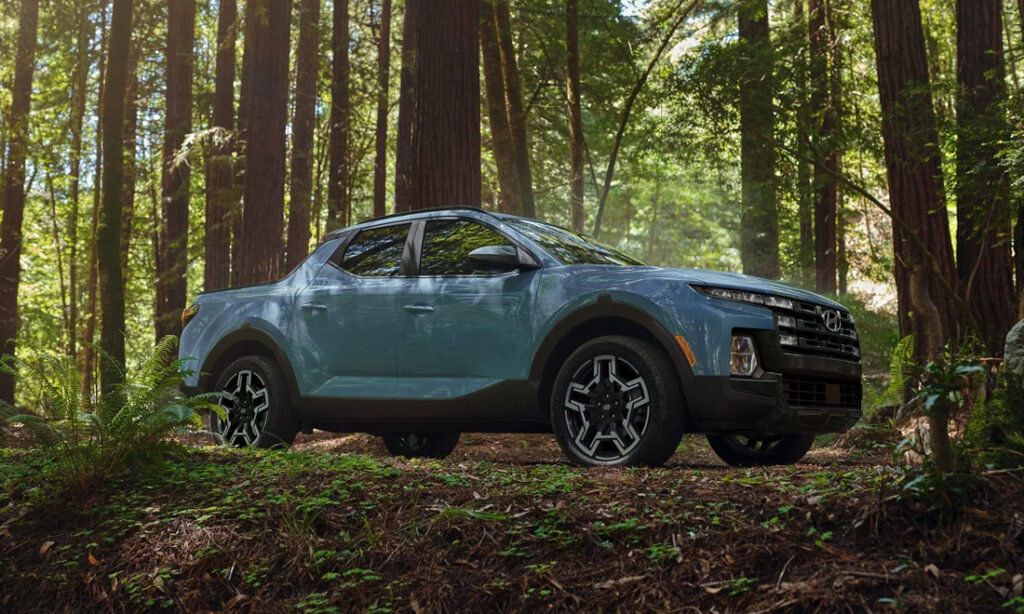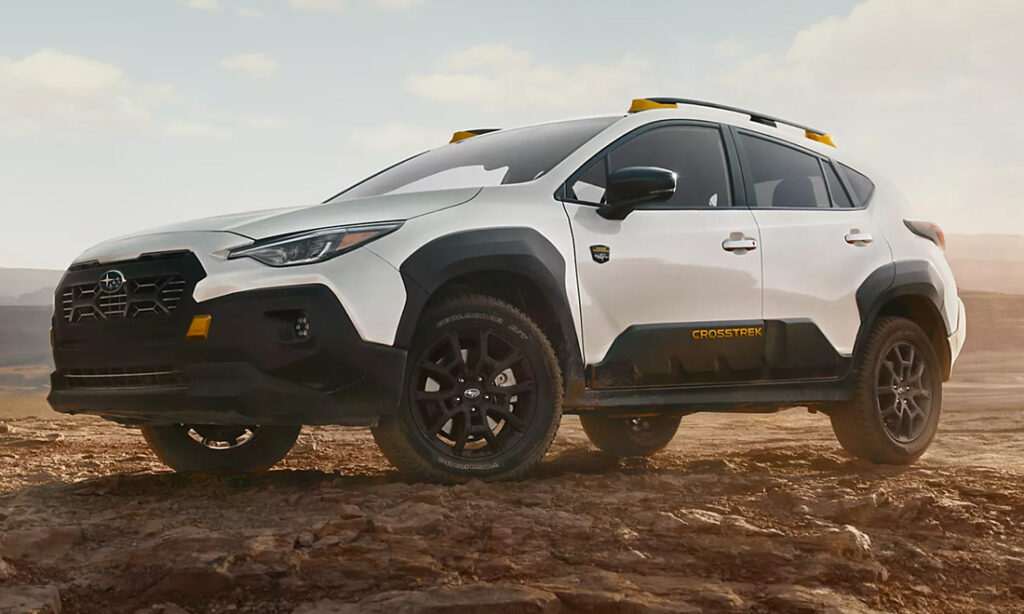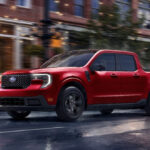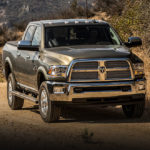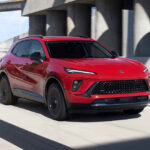2023 Hyundai Kona Review
What do our experts think of the 2023 Hyundai Kona? We look at powertrain, interior options, trim levels, and more. Find out our thoughts here.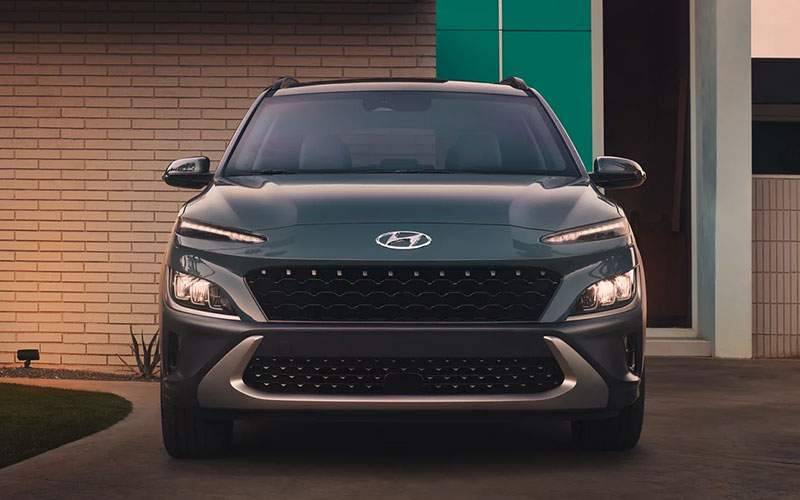
2023 Hyundai Kona – hyundaiusa.com | Shop 2023 Hyundai Kona on Carsforsale.com
What’s new for the 2023 Hyundai Kona?
Hyundai has simplified the Kona lineup for 2023 by reducing optional extras and including them or excluding them altogether from some trims. For example, blind-spot monitoring and rear cross-traffic alert are now standard across the lineup.
The N-Line gets a sunroof and a 10.25-inch infotainment as standard equipment. But the Smart Cruise system and the premium Harmon Kardon sound system from last year are now only available on the Limited trim.
The Breakdown
Kona N is fabulous
Above average tech
Good pricing
Aging interior
Limited driver-aid availability
Slow CVT on base engine
Kona N AWD please
2023 Kona Specs
- 147 horsepower from base engine
- 132 lb-ft of torque from base engine
- 5 available trims
- 19.2 cu-ft of cargo capacity
- 45.8 cu-ft of cargo capacity with seats down
- Optional Heads-Up Display
- Available radar cruise control
- 10-year powertrain warranty
2023 Hyundai Kona Powertrain
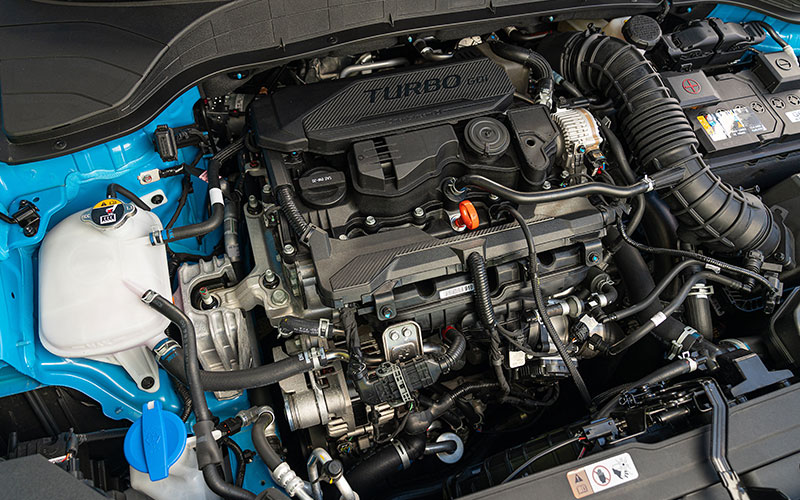
Hyundai offers three four-cylinder powertrains for the Kona this year. To kick off the lineup there’s the same faithful 2.0-liter from last year. It develops 147 hp and sends it to the front wheels or all four through a continuously variable transmission (CVT). As car people, it’s our least favorite for two main reasons. First, it’s the slowest of the bunch and second, the CVT makes it less enjoyable to drive.
Truthfully, we feel like most buyers won’t be worried about either of those caveats. In everyday driving duty, it’s a fine powertrain with more than enough capability for the average driver. We really like the 195 hp 1.6-liter turbocharged engine found on the N-line though. It’s properly reactive when one dips into the throttle and the seven-speed dual-clutch automatic is one of our favorites. Sure, it’s a bit clunky at low speeds sometimes but it’s fast between gears at higher speeds where it counts.
Finally, the new Kona N is a marvelous performer. It gets a turbocharged 2.0-liter engine and develops 276 hp. While we wish Hyundai would offer AWD in the N, we’re happy to report that the electronic limited-slip differential and the eight-speed dual-clutch transmission do a lot of heavy lifting to make this FWD car feel a lot more dynamic than it should. It’s properly fast, handles great, and sounds fantastic. Don’t get it mixed up for a serious off-roader though. It might be an SUV but if you want to go where the road runs out we’d suggest something more akin to the Subaru Crosstrek.
2023 Hyundai Kona Fuel Economy & MPG
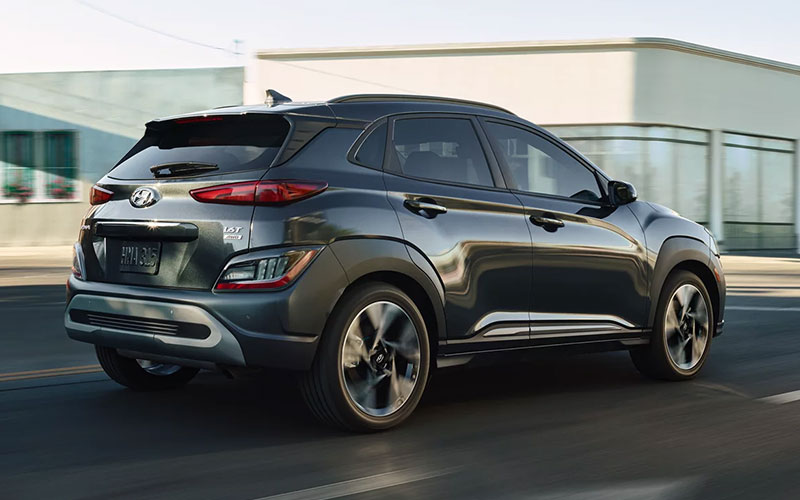
Engine choice can make a huge difference when it comes to fuel economy in the Kona for 2023. With the introduction of the N, the whole lineup’s average has dropped some. The ferocious little SUV gets an EPA-estimated 23 mpg combined. That’s a far cry from the base 2.0-liter and 1.6-liter turbo which both get up to 32 mpg combined. Compared to the rest of the segment, the Kona gets slightly above-average numbers.
Interior, Comfort, & Cargo Space
Despite its diminutive size, the Kona can transport five adults in relative comfort for many hours at a time. That comes down to great seat cushioning and cabin packaging which provides ample head and knee room in both rows. Visibility out of the front row is good too which makes maneuvering this small SUV all the easier.
The interior is fairly simple. The design features mostly rounded edges and high-quality panel gaps that look like they could be from a car above this one’s price point. At the same time, the materials themselves won’t win any awards or shock passengers unless you’re in the $30k+ Limited or N trim.
Mazda does a better job of providing a premium interior experience when compared to the Kona. Hyundai only offers two interior colors, grey or black, and you can only choose from those on two of the trim levels. All others get one or the other. Still, as we said last year, it’s a better interior than many would expect. Cargo space is good though with nearly 20 cubic feet behind the second row for gear. Fold those down and cargo space expands to over 45 cubic feet.
Entertainment & Technology
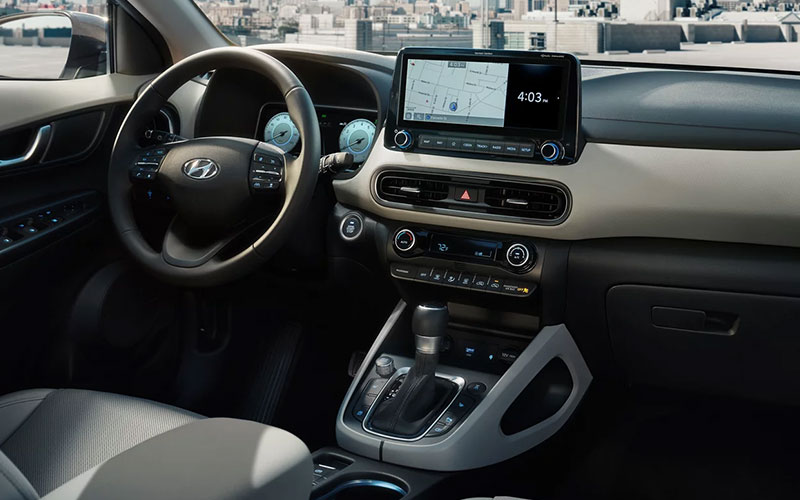
Hyundai offers a base 8-inch infotainment system and a larger, and standard on some trims, 10.25-inch version. Both are intuitive, easy to use, and visually engaging. We do wish they were a bit quicker as some inputs result in laggy response times. Additionally, those who get the nicer larger screen lose the ability to utilize wireless Android Auto and Apple CarPlay. That’s not a huge problem because the systems continue to work well but we’d love to see Hyundai upgrade that feature in the future. We do love the available 10.25-inch driver information display. It’s one of our favorites in the business thanks to clear graphics and good configurability.
Safety Features
Hyundai offers a solid package of good safety aids on every Kona. It includes a great lane-following system, automatic emergency braking, and lane-departure mitigation. Sadly, the only trim with adaptive cruise control is the Limited and the N. Neither the NHTSA nor the IIHS have given the Kona any safety awards.
2023 Hyundai Kona Trims & Pricing
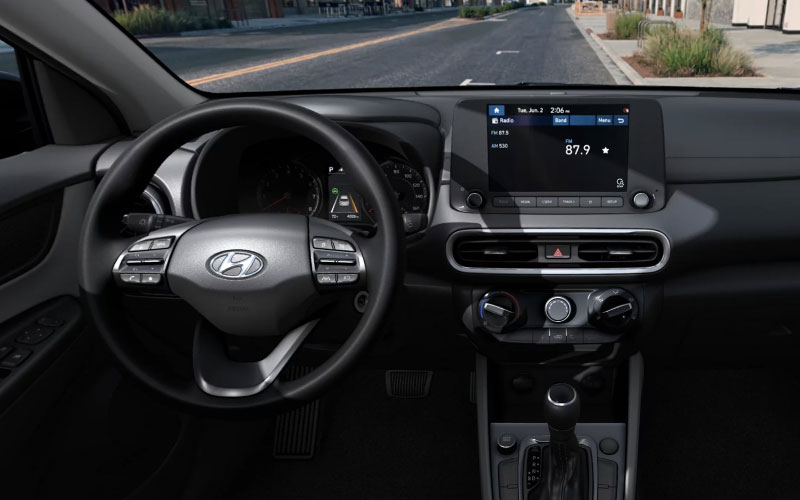
SE – $23,285
The base Kona gets the standard 2.0-liter engine, a continuously variable transmission, and front-wheel drive. AWD is available for $1,500. Standard equipment includes an 8-inch infotainment system, wireless Android Auto and Apple CarPlay, six speakers, 16-inch wheels, heated mirrors, a height-adjustable driver’s seat, and a USB port for rear-seat passengers. Safety equipment includes lane-keep assist, lane-departure mitigation, forward collision mitigation, and blind-spot monitoring.
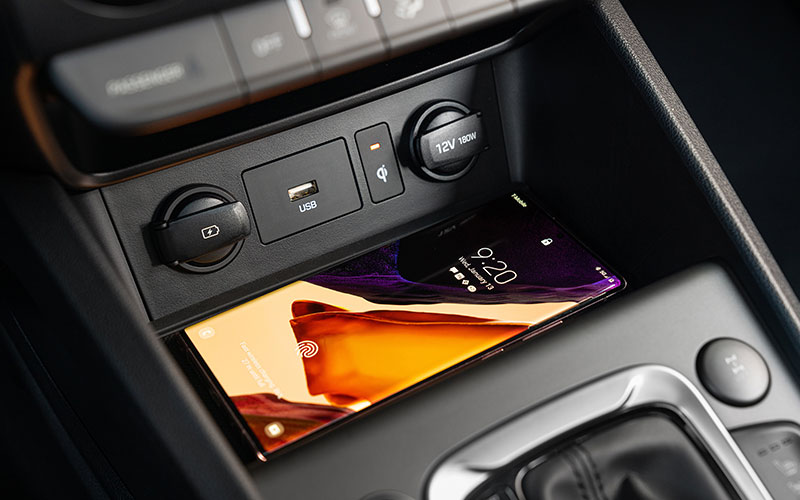
SEL – $25,095
Step up to the SEL and you’ll get 17-inch wheels, keyless entry and ignition, roof rails, remote start, tinted rear windows, and satellite radio. Buyers can also add a convenience package that includes heated front seats, a wireless charging pad, automatic climate control, and a sunroof.
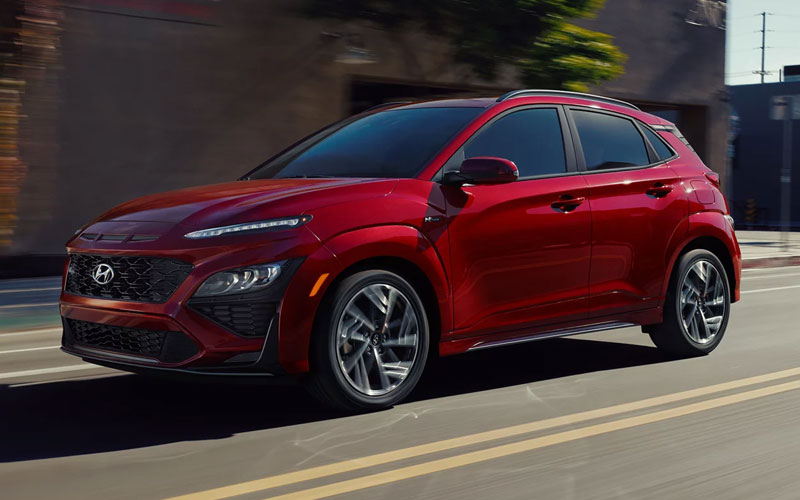
N-Line – $28,995
Consider this the first sporty Kona. As such, it gets the 1.6-liter turbocharged engine mentioned above. It also gets 18-inch wheels, sportier bumpers, a panoramic sunroof, and an upgraded infotainment system which now spans 10.25 inches and includes navigation. The gauge cluster also gets an upgrade to that same screen size.
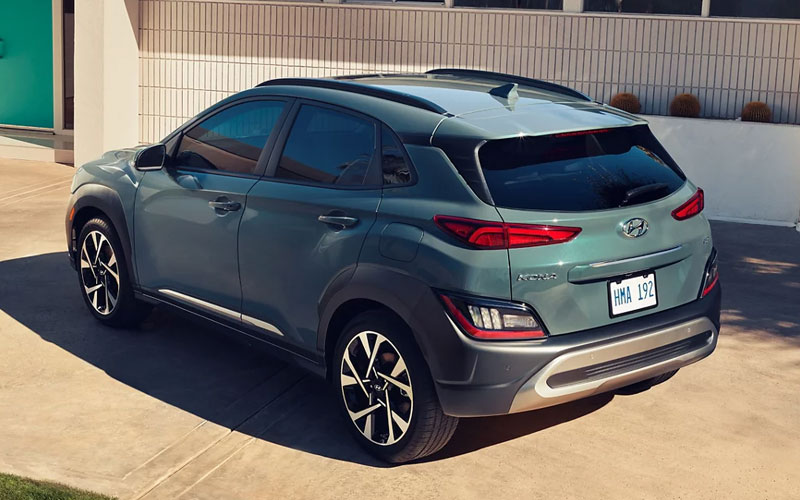
Limited – $30,095
The Limited is the most luxurious Kona. It gets upgraded interior trim, leather upholstery, 18-inch wheels, automatic wipers, an auto-dimming rearview mirror, rear parking sensors, and adaptive cruise control.
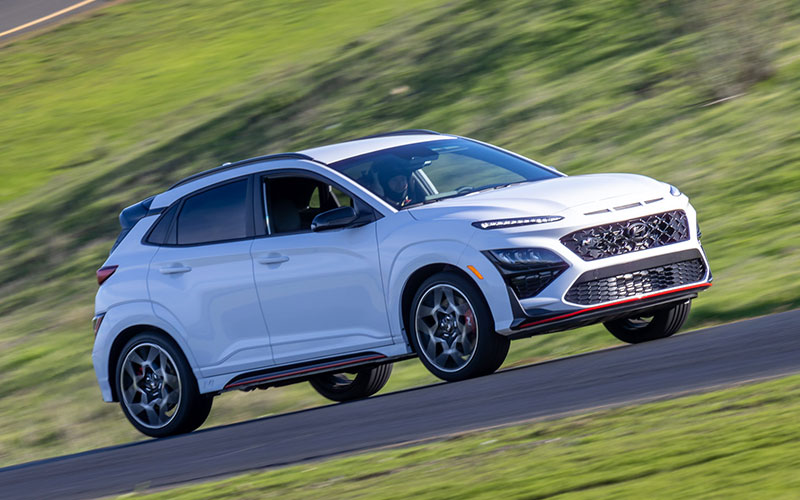
N – $35,995
The Kona N is a different animal from the rest of the lineup thanks to its excellent 276-hp 2.0-liter turbocharged engine. It only comes with FWD. It loses adaptive cruise control and the sunroof but gains a variable sport exhaust, bigger brakes, 19-inch wheels with performance tires, an electronic limited-slip differential, selectable driving modes, adjustable lumbar support, leather upholstery with suede inserts, and blue interior accents.
Warranties
Every Kona comes with the same five-year or 60,000-mile limited warranty and a 10-year or 100,000-mile powertrain warranty. That’s by far the best in the business save for Hyundai’s partners Kia and Genesis. Hyundai also offers three years or 36,000 miles of complimentary maintenance
What we think
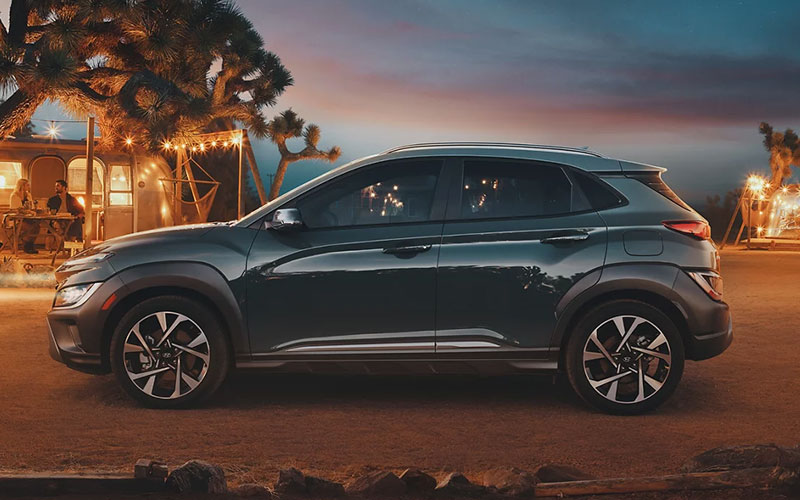
2023 Hyundai Kona – hyundaiusa.com | Shop 2023 Hyundai Kona on Carsforsale.com
The Kona is a solid value among its contemporaries and that’s before consideration of any new car incentives. We think that the N and the Limited are a bit pricey but likely still worth their value thanks to great performance and safety tech as well. It’s rare to find a little car at this price that can do so much but the 2023 Hyundai Kona checks all of the most important boxes.


